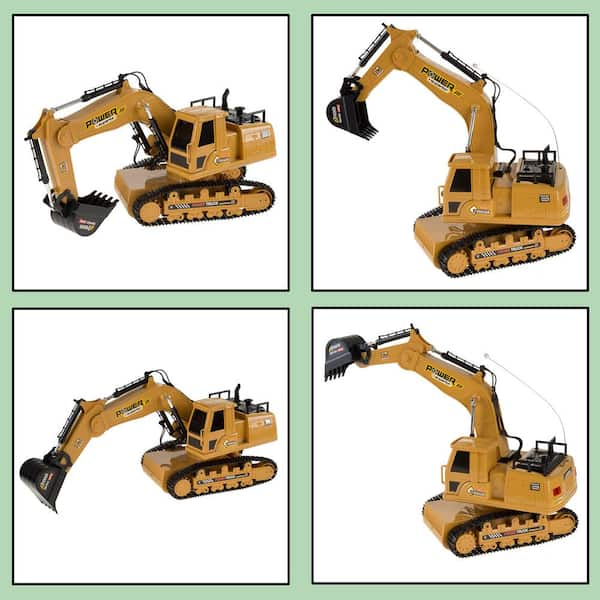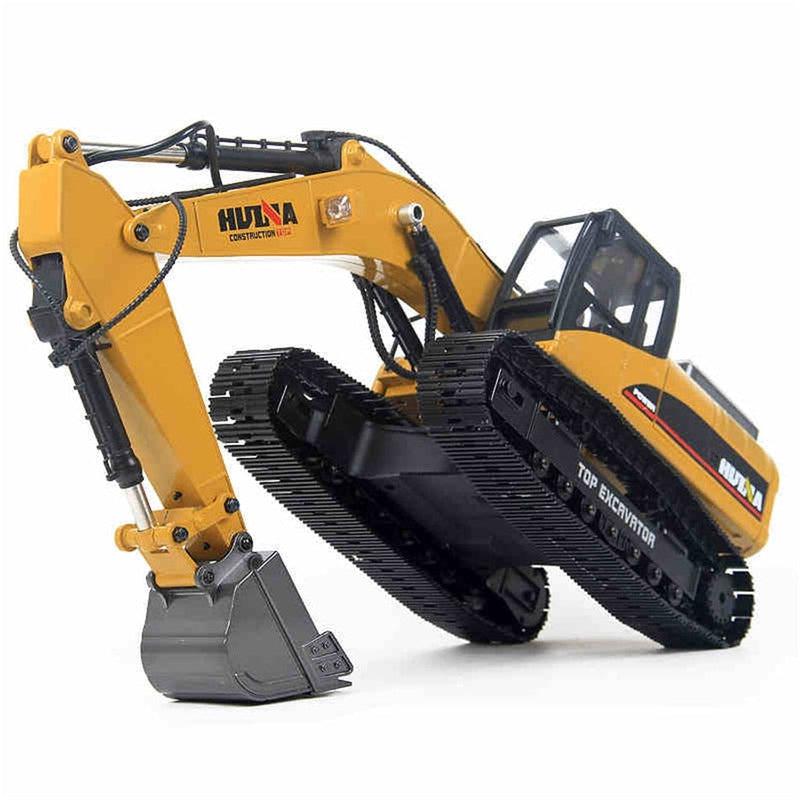Discover the Importance of Excavator in Modern Building Projects
Excavators are necessary tools in modern construction jobs. Their flexibility permits them to perform a vast array of tasks, from excavating and grading to demolition and website prep work. Advanced functions, such as hydraulic add-ons and GPS, enhance their abilities and efficiency on job sites. As the industry evolves, the significance of excavators grows much more. Comprehending their role can reveal insights right into the future of building and construction techniques. What lies ahead for these equipments?
The Adaptability of Excavators in Various Projects
Although excavators are frequently connected with massive construction tasks, their flexibility allows them to be utilized in a variety of applications, from household landscaping to utility maintenance. In urban settings, excavators can browse tight rooms to dig foundations for homes or mount drainage systems. Their capacity to do delicate tasks makes them optimal for landscaping projects, where they can excavate for fish ponds or plant trees. Furthermore, excavators play a necessary role in energy upkeep, successfully digging trenches for pipelines or cable televisions without interfering with bordering locations. In agricultural applications, they assist in land clearing up and soil prep work. Moreover, their flexibility enables them to be furnished with different accessories, enhancing their capability across various tasks. This complex nature of excavators not only simplifies various building and construction processes however also demonstrates their important function in contemporary facilities development and maintenance.
Trick Features and Kinds Of Excavators
The discussion on essential features and sorts of excavators highlights the essential qualities that make these machines important in construction. Different excavator kinds, each designed for particular tasks, demonstrate their convenience and performance across various applications. rc excavator. Recognizing these features and classifications is important for enhancing their use in modern building and construction tasks
Excavator Types Overview
Excavators play a crucial role in modern construction, providing adaptability and performance across numerous tasks. These heavy machinery units been available in numerous types, each tailored for certain applications. One of the most typical kinds consist of spider excavators, known for their stability on unequal surface, and wheeled excavators, which provide higher mobility on smooth surfaces. Miniature excavators are favored for limited areas and small-scale projects, while long-reach excavators are developed for deep digging. Furthermore, there are specialized excavators, such as hydraulic excavators, which enhance power and precision. Each type includes distinct capabilities, making them important for tasks varying from digging and grading to demolition and material handling. Understanding these variants permits building and construction professionals to choose the ideal excavator for their job requires.
Secret Features Explained
Comprehending the crucial functions of excavators enhances their reliable application in building jobs. Excavators are defined by their effective hydraulic systems, which give the essential force for digging, lifting, and moving products. Their articulated arms permit a variety of movement, helping with exact operations in restricted areas. Additionally, the range of attachments, such as containers, grapples, and augers, broadens their flexibility to satisfy various job demands. The dimension and weight of excavators additionally contribute to their security and maneuverability on various terrains. Improvements in modern technology have actually led to the assimilation of General practitioner and automation, boosting precision and performance in excavation tasks. These functions jointly place excavators as important devices in modern building.
Applications in Building
Transforming building sites, excavators play an essential function throughout numerous applications, ranging from household building jobs to large-scale facilities growths. These flexible machines are outfitted for tasks such as digging structures, trenching for utilities, and site grading. Various sorts of excavators, consisting of crawler, wheeled, and mini excavators, provide particular advantages customized to the job needs. Spider excavators master harsh terrains, while rolled excavators use flexibility on paved surface areas. Mini excavators are perfect for restricted spaces, making them popular in urban settings. The efficiency and power of excavators considerably speed up construction processes, ensuring timely task conclusion. Their flexibility further enhances their value, enabling construction groups to tackle a varied selection of difficulties properly.
Enhancing Efficiency and Performance on Job Sites
Maximizing performance and performance on work websites is a critical goal in contemporary building and construction. Excavators play an essential duty in accomplishing this objective by enhancing different tasks. Their ability to carry out several features-- such as grading, excavating, and lifting-- minimizes the demand for additional devices, therefore conserving time and resources.Moreover, excavators improve operations by permitting faster completion of jobs. With sophisticated features like hydraulic attachments and general practitioners technology, they can perform accurate operations that minimize mistakes and remodel. This accuracy not only enhances the top quality of work yet also maximizes that site material usage, adding to cost savings.The versatility of excavators enables them to adapt to different site conditions, ensuring that tasks proceed efficiently no matter difficulties. By integrating excavators into building and construction processes, teams can significantly enhance their overall productivity, leading to prompt project completion and raised productivity.
Safety And Security Benefits of Making Use Of Excavators
Excavators substantially boost safety on construction websites via improved driver presence and reduced manual work risks. By giving drivers with a clear view of their surroundings, excavators help to stop mishaps and injuries. In addition, the equipment decreases the demand for employees to involve in harmful hands-on jobs, further promoting a much safer workplace.
Improved Driver Presence
Although construction sites can be disorderly and loaded with prospective risks, enhanced operator presence plays an essential role in making sure safety and security when utilizing excavators. Modern excavators are developed with large, unhampered windows and tactically put mirrors, allowing drivers to keep a clear view of their surroundings (rc excavator). This improved visibility is critical for detecting pedestrians, various other equipment, and numerous barriers, considerably decreasing the danger of mishaps. Additionally, several excavators incorporate innovative innovation, such as video cameras and sensors, to provide operators with added viewpoints, additionally improving awareness. The ability to see more clearly not only help in efficient procedure but also fosters a safer work atmosphere, making it easier for operators to browse complex building and construction websites without compromising security requirements
Minimized Manual Labor Dangers
When manual labor is decreased with the usage of excavators, countless safety benefits arise, markedly boosting the wellness of construction employees. Excavators lessen the physical strain related to heavy training and recurring jobs, successfully reducing the threat of musculoskeletal blog here injuries. By automating procedures such as digging, grading, and moving materials, they enable workers to maintain a safer range from potential risks. In addition, excavators are outfitted with innovative security attributes, such as rollover security systems and boosted operator comfort designs, which even more guard personnel on website. The outcome is a substantial reduction in work environment mishaps and injuries, resulting in enhanced efficiency and spirits among building groups. Inevitably, the adoption of excavators adds to a more secure and a lot more effective building and construction environment.
Excavators in Earthmoving and Website Prep Work
In modern building, a considerable part of earthmoving and site prep work tasks counts on the performance and versatility of excavators. These equipments are designed to manage various soil kinds and terrain, making them important for grading, digging, and trenching tasks. Their hydraulic arms can be furnished with different add-ons, such as pails and augers, enabling operators to personalize their method based upon certain task requirements.Excavators stand out at moving huge volumes of planet promptly and successfully, which accelerates the total building timeline. They can browse limited areas and testing websites where conventional equipment may have a hard time, enhancing performance. Furthermore, the precision of excavators assurances that website preparation follows strict specs, lessening the threat of errors that might result in costly rework.
The Duty of Excavators in Demolition Tasks
Excavators play a vital function in demolition tasks, as they possess the power and agility needed to take down frameworks effectively. Equipped with different attachments such as hydraulic breakers, shears, and grapples, these machines can adjust to various demolition demands, whether for small structures or large try this out industrial websites. Their adaptability allows operators to tackle complicated jobs while keeping security and precision.In enhancement to their demolition capacities, excavators help with debris removal, making sure that job sites stay orderly and risk-free. By breaking down structures into manageable items, they enable streamlined cleaning and recycling of materials, straightening with modern-day sustainability efforts.Moreover, excavators can access tight spaces and navigate irregular terrain, making them essential in city demolition jobs. On the whole, their durable style and multifunctionality make excavators a crucial asset in the demolition stage of building and construction, adding significantly to job timelines and performance.


Future Trends in Excavator Innovation and Usage
As the building and construction market advances, innovations in excavator modern technology are positioned to change their use and performance noticeably. One considerable fad is the combination of automation and expert system, enabling excavators to operate with minimal human intervention. This shift will certainly boost accuracy in tasks such as grading and trenching, lowering human error and increasing productivity.Additionally, the rise of hybrid and electric excavators is forming an extra sustainable construction setting, lowering carbon emissions and fuel prices. Enhanced telematics systems are also arising, making it possible for real-time tracking of device performance and maintenance requirements, which can result in far better functional performance and longer tools lifespan.Moreover, developments in add-on modern technology are increasing the flexibility of excavators, enabling them to execute a broader series of tasks. The mix of these patterns shows a future where excavators are smarter, greener, and extra adaptable, eventually improving building and construction task dynamics.
Frequently Asked Concerns
Just How Do Excavators Contrast to Various Other Building And Construction Machinery?
Excavators, defined by their convenience and power, master excavating and earthmoving contrasted to various other equipment. Their ability to carry out various tasks, including training and demolition, makes them important in building tasks, boosting overall effectiveness.

What Is the Ordinary Lifespan of an Excavator?
The average life expectancy of an excavator generally ranges from 7,000 to 10,000 operating hours, depending on upkeep, usage problems, and model. Appropriate treatment can expand this life expectancy, making sure peak efficiency throughout its functional years.
Just How Are Excavators Kept for Optimum Efficiency?
Excavators need routine upkeep for peak efficiency, consisting of routine assessments, liquid checks, filter replacements, and timely repairs. Carrying out a preventive upkeep timetable helps lengthen their life-span and assurances reliable procedure in numerous building environments.
What Are the Expenses Related To Acquiring an excavator vs. leasing?
The expenses connected with getting an excavator versus renting vary significantly. Renting deals lower upfront expenditures yet can accumulate over time, while acquiring needs a considerable initial investment, however provides lasting financial savings and property ownership advantages.
What Training Is Needed to Run an Excavator?
Running an excavator requires specialized training, commonly consisting of security protocols, maker procedure strategies, and environmental awareness. Accreditation programs frequently mandate functional experience, enabling drivers to handle various tasks effectively while ensuring conformity with sector laws. The most common types consist of crawler excavators, understood for their stability on irregular surface, and wheeled excavators, which offer better movement on smooth surface areas. Miniature excavators are favored for small-scale jobs and tight areas, while long-reach excavators are created for deep digging. In addition, there are specialized excavators, such as hydraulic excavators, which boost power and accuracy. Different kinds of excavators, consisting of spider, rolled, and mini excavators, supply specific advantages tailored to the job needs. Crawler excavators stand out in rough surfaces, while rolled excavators offer movement on paved surfaces.